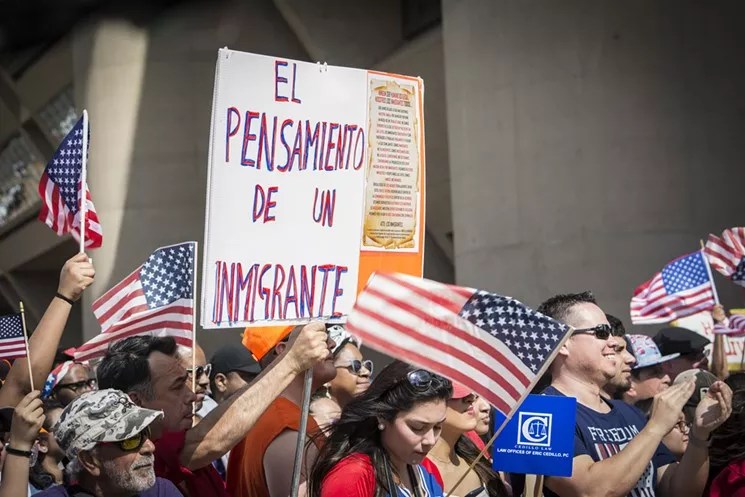
Elroy Johnson

Audio By Carbonatix
All but one provision of Texas’ 2017 sanctuary cities law can be enforced as the law makes its long journey through the federal courts, the 5th U.S. Circuit Court of Appeals ruled Tuesday.
The bill, which is the subject of a legal challenge from the cities of Dallas, Austin, Houston, San Antonio and El Paso, among others, allows local law enforcement officers in Texas to question the legal status of anyone they detain or arrest and threatens to punish any local government entity or official who doesn’t cooperate with detention orders issued by U.S. Immigration and Customs Enforcement.
Another piece of the bill, the most controversial and the part that’s still on hold, threatens any local official found to have “adopted, enforced or endorsed” policies that limit or prohibit immigration enforcement with removal from office and time in jail.
“With one exception, SB 4’s provisions do not, on their face, violate the Constitution,” the court’s opinion reads.
The circuit court’s decision comes in response to a challenge from Texas Attorney General Ken Paxton, who appealed a lower court decision that would’ve put all of the bill on hold as the cities’ lawsuit against the state proceeds in U.S. District Court.
“With one exception, SB 4’s provisions do not, on their face, violate the Constitution.” – 5th U.S. Circuit Court of Appeals
“I’m pleased the 5th Circuit recognized that Senate Bill 4 is lawful, constitutional and protects the safety of law enforcement officers and all Texans,” Paxton said after the ruling. “Enforcing immigration law prevents the release of individuals from custody who have been charged with serious crimes. Dangerous criminals shouldn’t be allowed back into our communities to possibly commit more crimes.”
The American Civil Liberties Union of Texas, which is helping with the case against the law, said after the ruling that it will look at challenging its enforcement, in addition to the law itself, now that it is going into effect.
“We are exploring all legal options going forward. The court made clear that we remain free to challenge the manner in which the law is implemented, so we will be monitoring the situation on the ground closely,” said Lee Gelernt, deputy director of the ACLU’s Immigrants’ Rights Project. “We are also pleased that the court narrowed the law in certain respects.”
Chris Turner, chairman of the Texas House Democratic Caucus, said the law, whether it is constitutional or not, is bad policy.
“Today’s ruling by a three-judge panel of the 5th Circuit doesn’t change the fact that Senate Bill 4 is unnecessary, makes Texas communities less safe and complicates law enforcement officials’ already difficult jobs,” Turner said. “The discriminatory impact of the law has already had repercussions across the state, casting a chilling effect throughout Texas’ Latino communities. Today’s ruling is one step in what is likely a long legal battle, and I remain hopeful that this law will eventually be ruled unconstitutional by the courts.”